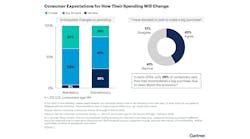When Mexico's anti-trust watchdog Federal Competition Commission (known in Mexico as CoFeCo) approved the grocery retail consortium Sinergia this past July, it was seen by some observers as a declaration of retail war against colossus Wal-Mart Stores Inc., the country's largest company.
Sinergia is a bulk purchasing pool made up of family-owned supermarket chains Comercial Mexicana, Gigante and Soriana. The consortium had no easy time getting approved by CoFeCo, but thanks in part to relentless lobbying efforts, Sinergia is finally standing on its own two legs.
According to one of those lobbyists, marketing consultant Angelica Rendon, the Sinergia project began shortly after Wal-Mart withdrew its membership in the Mexican National Association of Department Stores (ANTAD, in Mexico) for no apparent reason. This left ANTAD members and the rest of the supermarket chains in Mexico to speculate as to why Wal-Mart broke away from the herd. ANTAD sought advice from Rendon's consulting firm, since Wal-Mart was beginning to gobble up the Mexican retail market. At this point, Rendon stepped into the fray.
"I casually suggested," says Rendon, "that to be competitive with Wal-Mart, ANTAD could undertake joint purchasing in order to negotiate bulk pricing as a group. All I received from the group was a blank stare."
The parents of the current owners of these companies had developed their businesses from corner grocery stores into supermarket chains, Rendon explains, "but they had never developed any corporate mentality." In short, they didn't quite know what to do to compete against the likes of Wal-Mart.
"They realized they had to pool resources, but in order for that to work they would have to meet certain conditions," she continues. "When we outlined our plan, they became irritated because they misperceived the proposal as an attempt at a merger. We had to convince them that it was not about merging, but in order to continue as competitors, they would have to deal with the new circumstances they were in."
They would have to get serious about supply chain collaboration, on the theory that the enemy of my enemy is my friend. They would also have to get a clearer picture of the Mexican retail market.
"What finally brought them together," explains Rendon, "was a desire to compete. They realized they needed better rules to play in the game and the best rule of the game is to have bigger purchasing power. That group perception led to the creation of this purchasing pool."
When proposed at CoFeCo, the Sinergia concept came under fire immediately from the Consumer Product Council of Mexico (ConMexico), a 46-member organization representing major consumer goods companies such as Coca-Cola, Procter & Gamble, Colgate-Palmolive and Philip Morris. ConMexico feared that Sinergia would fix prices through bulk purchasing and hurt suppliers.
Rendon also suspects, though she has no proof, that Wal-Mart itself opposed the formation and approval of Sinergia. Wal-Mart's official statement to date on the creation of Sinergia has been no comment.
Although Sinergia was initially rejected by CoFeCo, Rendon persevered and renegotiated for approval, which was officially announced in July.
Though CoFeCo — for reasons of its own — won't disclose all clauses in the operating permit until the end of 2005, it is clear that as a purchasing agent Sinergia acts only as a representative company. It has no assets. Its executives have to sign confidentiality agreements with the three participating chains in order to prevent price-fixing and to avoid monopoly practices.
Sinergia must issue a twice-yearly report to CoFeCo detailing its purchasing agreements. First executive director of the company is Jose Luis de Cortina, a former CEO of Eveready Colombia. Its office is now in operation and has a total of 10 employees.
Sinergia currently is streamlining the purchasing habits of the three chains on a limited number of items, all of them so far from domestic Mexican suppliers, according to Rendon. Sinergia now controls 30% of the three companies' buys. This is noteworthy since it was originally intended that the three companies would do joint international purchases as well as streamline logistics costs. They are streamlining, but purchases are not yet at an international level.
Rendon is pleased her brainchild is now in operation. Among her many satisfactions in gaining approval for Sinergia is that native Mexican supermarket chains are moving toward a corporate mentality without abandoning their own styles of marketing and uniqueness.
Going up against Wal-Mart may be a daunting challenge, but Rendon wants " Mexican supermarkets to stay Mexican." This, she says, is the first step.


